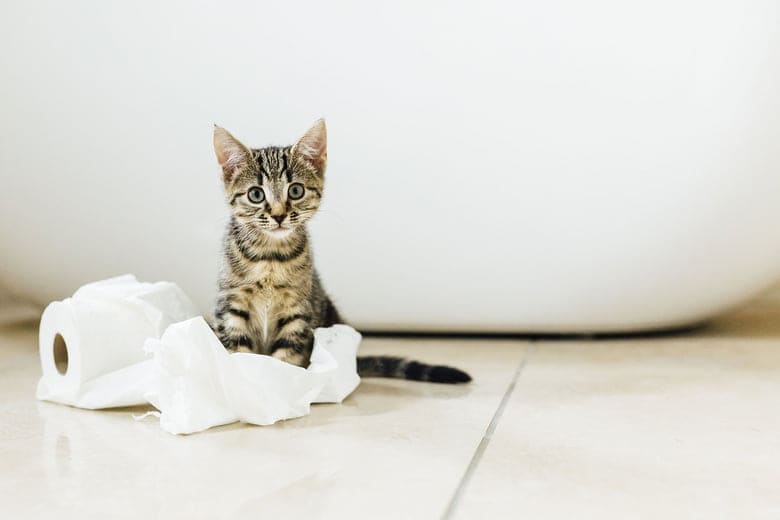by freelance writer Riley Herder
Few things are quite as comforting as holding a soft, new, fuzzy kitten to your cheek and hearing its tiny voice. But if that adorable kitten happens to be your own (and your first cat in general), you may have some learning to do, especially if it is a young orphaned kitten. Care.com has many resources for pet owners, as well as sitters when you need to travel.
One of the things I enjoy most about cats is that they are low maintenance and require less hands-on house training than dogs. In fact, their strong natural instinct to bury their waste will do most of the work for you. Still, there are things you will need to do to make that learning process smooth and simple for your new feline friend.
Getting Started
If this is your first time looking after a cat, you will need to acquire some litter supplies:
- Litter box
- Slotted scoop: I prefer a strong handled metal scoop instead of flimsy plastic ones. But most importantly, make sure that the holes are appropriately sized for the type of litter you use. If the holes are too small, you will end up wasting litter.
- Cat litter: There are many different types of litter, and some cats will be pickier than others. The litter will vary in types of material and characteristics, and there are even environmentally friendly options. Whatever you pick to begin with, just be prepared to experiment to find the right one for you and your cat.
- Baby gate (optional): If you have small children who have not yet learned to respect boundaries, save yourself the horror of “what is that you’re holding?!” and block off the space where your litter is.
- Waste bin with a tightly locking lid to keep odours out of your living areas
As mentioned before, cats generally don’t need much teaching when it comes to using a litter box.
If you are raising an orphaned kitten, you will need to learn how to stimulate them to go, the way a kitten’s mother normally would until they are ready for a litter box. You will not be introducing them to a litter box until they are between 4 and 6 weeks. Usually when that time comes, it does not take long before they naturally recognize the litter as a welcomed place to go.
If there are accidents or messes during this time, it is important not to punish your kitten. This can create a lot of problems in both the short and long term and is ultimately ineffective. Simply encourage them to find the box, and provide positive affirmation when they get it right.
>> Looking for pet care? Find cat sitters in your area now.
Keep it Clean
Cats like things ultra clean. It’s why they spend multiple hours cleaning themselves each day. Their litter preferences are not different.
Using your slotted scoop, take out all the solids at least once a day, as well as clumps of urine that accumulate. Know that even with a daily scooping (or more), the box itself will get dirty over time and it is good to wash it frequently. Avoid overfilling the box
Litter Problems
If you are keeping your litter box clean, and suddenly your well-trained cat starts to go outside of the box a time or two, don’t be alarmed. For the first six months or so, it is normal during what’s known as the kitten stage to have accidents. Be patient, and continue offering encouragement.
If the problem occurs two or more times in a row, it is possible that there is a medical issue needing your attention. It is important to bring the kitten in to see the veterinarian to assess what the problem may be.
A number of medical issues may cause your kitten to not use the litter box, such as infection, parasites, and urinary tract infections (UTI).
Note: If your kitten is male, you will especially want to look out for signs of UTI, because it can cause serious harm to him if not dealt with quickly. If, in addition to not using the litter box, he seems to be irritated in his genitals and licking them beyond the normal cleaning, get him to the vet’s office right away.
If the veterinarian concludes that there is no medical cause, then it is worth considering what else may be causing the behaviour. Take a moment to assess whether you have recently made one of these changes to their environment:
- Another pet in your home
- A different litter
- Increase of stress in the home
- Starting use, or change, of medicine
- A recent veterinary visit or procedure
- Any other sudden change in your home or schedule such as painting a room, or working different hours
>> Looking for pet care? Find cat sitters in your area now.
